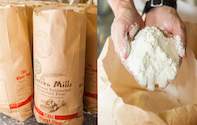
Eureka Mills is part of a larger history of flour milling in South Africa, which started during the 19th century.
Wheat farming and flour milling has been one of the country’s most prominent and profitable agricultural ventures.
The first flour mills were built in the Overberg region in the 1800s, starting as small-scale farming operations. Millers would cultivate and farm their own wheat and mill it before selling it at their local market. Some farmers would also use the flour to bake their own bread and pastries.
The grain milling sector has always played a vital role in food security, as its products are the primary ingredients of South Africa's staple foods. The sector is also a major determinant of the price of maize meal and bread.
Conventional flour mills are ground at high speeds that can generate heat in excess of 90°C. Flour bakes at 40°C, so at high temperatures, this process creates starch-damage that transforms the proteins in the wheat from its natural state. It also allows bakery products to absorb more water, depleting nutritional value even further. Vitamins & nutrients are added to the flour to fill it up.
Eureka Mills produces stone ground flour where the two millstones grind at slower speeds and generate heat of no more than 36° – 38°C, which means the protein stays intact. The result is a healthier, more digestible flour.
 Stone ground flour is nothing new, but dates back to ancient Egyptian times when grains were crushed with a stone mortar or with a saddle st...
Stone ground flour is nothing new, but dates back to ancient Egyptian times when grains were crushed with a stone mortar or with a saddle st...